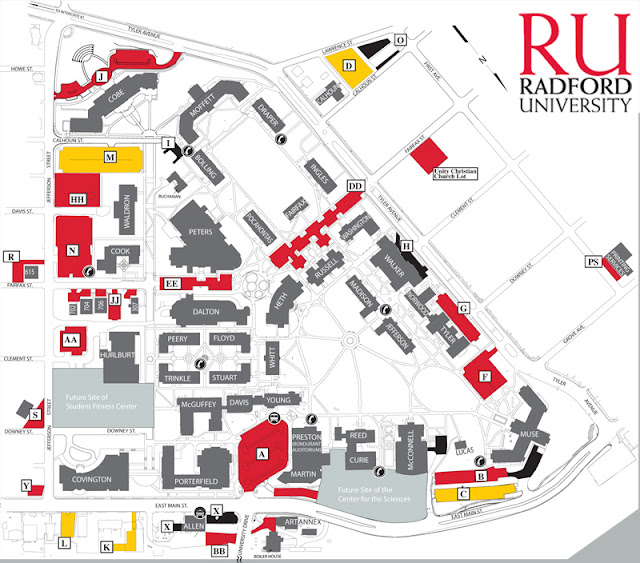Fighting for Truth with Compassion
The Story Project was created by Shin Maang as a creative way to engage students with stories from Scripture where Jesus enters into places of pain and brokenness to bring healing and hope. At Radford I have been using this mural to help students journey through Jesus' ministry and challenge them to invite Jesus into the places of pain in their own lives.
This week I sat with four students in the corner of Young Hall for our weekly "Core" gathering. I pointed to the woman dressed in red in the lower right corner of the mural. I asked if any of them had an idea what story this might be portraying. One or two students had some guesses but the rest had puzzled looks on their faces. "This woman was caught in adultery and brought to Jesus," I explained as I handed out copies of John 8. As the students read the story, a lively conversation ensued among the students.
"This woman is just being used by the Pharisees for their set-up plan against Jesus!" one student said, clearly offended. Another student asked what Jesus was writing in the dirt... the question most of us have when we read about how Jesus, confronted with the question from the Pharisees about whether this woman should be stoned or not, did not answer verbally but stooped to write (or draw) in the sand.
"I like that Jesus didn't judge this woman," a quiet student piped up. "He told them all not to judge her and I think that's how we should live, not judging anyone because everyone is just trying to live their life."
"That's an interesting observation," I ventured in. "Do you really think Jesus is indifferent toward the Pharisees or toward how the woman is living her life? Because it sounds like you see Jesus as being pretty indifferent as long as they aren't judging or being judged."
The conversation continued for several minutes among the students. Two students held the opinion that Jesus is offering forgiveness for the woman and telling us to live our lives and not judge but also remember that God always forgives Two other students presented their opinions that Jesus DID care about how the woman lived her life and were impressed that Jesus was able to get out of the Pharisees' trap while also offering the woman forgiveness and restoration. I let the students talk for a while, then jumped in.
"In our culture today I think most of us want to hear Jesus' words to the woman, 'Then neither do I condemn you.' We are also told over and over again not to judge because we aren't perfect." I could tell at least one student was uncomfortable with where I might be headed.
"Jesus never disagreed with the Pharisees. This is Jesus' great opportunity to change the law or to tell us it no longer matters. Even though Jesus doesn't speak, he does uphold the Law. What does that mean for us?"
The students agreed (some more willingly than others) that if Jesus was going to change the Law or say something different this was his chance.
"You are right when you say Jesus offered this woman compassion and forgiveness. But you cannot ignore the rest of what Jesus tells the woman. 'Now go and leave your life of sin.' We in our culture love to hear, 'Then neither do I condemn you,' but we don't want to hear Jesus say, 'Now go and leave your life of sin,' because that means we must admit that there is absolute right and wrong and that we are in need of forgiveness."
Several of the students nodded thoughtfully. One or two still seemed unconvinced.
"When we come to Jesus," I continued, "we must admit that there is truth. There is right and wrong. And we also must admit that we don't get to decide for ourselves what right and wrong is. If we come to Jesus he does want to say, 'Then neither do I condemn you.' He will also tell us to go and live differently. We cannot hear the first part of Jesus' statement if we aren't really willing to hear the second part."
Students today are bombarded with the message that truth is what you make of it. They are told to live by their own standards and not judge others. This in itself is a moral standard (though most would never recognize it). Though outwardly they live as if truth is relative, inwardly they long for deep truth. The Gospel fights for truth with compassion. Jesus radically commits to the truth that there is a moral right and wrong (that He has set). His shocking response to the Pharisees both upholds truth and frees the woman.
I wonder what it would look like for us to read John 8 more frequently and to press into what Jesus modeled for us--truth with compassion. We cannot sacrifice truth to show compassion... that is manipulation. Neither can we sacrifice compassion to speak truth... that is judgement. I pray that Intervarsity at Radford is the community where we are radically committed to hearing Jesus' whole statement in our own lives, "Then neither do I condemn you, now go and leave your life of sin." I pray that we are the community that fights for truth with compassion so that all of Radford will know what it means to walk in God's absolute truth and live in His compassionate forgiveness.
This week I sat with four students in the corner of Young Hall for our weekly "Core" gathering. I pointed to the woman dressed in red in the lower right corner of the mural. I asked if any of them had an idea what story this might be portraying. One or two students had some guesses but the rest had puzzled looks on their faces. "This woman was caught in adultery and brought to Jesus," I explained as I handed out copies of John 8. As the students read the story, a lively conversation ensued among the students.
"This woman is just being used by the Pharisees for their set-up plan against Jesus!" one student said, clearly offended. Another student asked what Jesus was writing in the dirt... the question most of us have when we read about how Jesus, confronted with the question from the Pharisees about whether this woman should be stoned or not, did not answer verbally but stooped to write (or draw) in the sand.
"I like that Jesus didn't judge this woman," a quiet student piped up. "He told them all not to judge her and I think that's how we should live, not judging anyone because everyone is just trying to live their life."
"That's an interesting observation," I ventured in. "Do you really think Jesus is indifferent toward the Pharisees or toward how the woman is living her life? Because it sounds like you see Jesus as being pretty indifferent as long as they aren't judging or being judged."
The conversation continued for several minutes among the students. Two students held the opinion that Jesus is offering forgiveness for the woman and telling us to live our lives and not judge but also remember that God always forgives Two other students presented their opinions that Jesus DID care about how the woman lived her life and were impressed that Jesus was able to get out of the Pharisees' trap while also offering the woman forgiveness and restoration. I let the students talk for a while, then jumped in.
"In our culture today I think most of us want to hear Jesus' words to the woman, 'Then neither do I condemn you.' We are also told over and over again not to judge because we aren't perfect." I could tell at least one student was uncomfortable with where I might be headed.
"Jesus never disagreed with the Pharisees. This is Jesus' great opportunity to change the law or to tell us it no longer matters. Even though Jesus doesn't speak, he does uphold the Law. What does that mean for us?"
The students agreed (some more willingly than others) that if Jesus was going to change the Law or say something different this was his chance.
"You are right when you say Jesus offered this woman compassion and forgiveness. But you cannot ignore the rest of what Jesus tells the woman. 'Now go and leave your life of sin.' We in our culture love to hear, 'Then neither do I condemn you,' but we don't want to hear Jesus say, 'Now go and leave your life of sin,' because that means we must admit that there is absolute right and wrong and that we are in need of forgiveness."
Several of the students nodded thoughtfully. One or two still seemed unconvinced.
"When we come to Jesus," I continued, "we must admit that there is truth. There is right and wrong. And we also must admit that we don't get to decide for ourselves what right and wrong is. If we come to Jesus he does want to say, 'Then neither do I condemn you.' He will also tell us to go and live differently. We cannot hear the first part of Jesus' statement if we aren't really willing to hear the second part."
Students today are bombarded with the message that truth is what you make of it. They are told to live by their own standards and not judge others. This in itself is a moral standard (though most would never recognize it). Though outwardly they live as if truth is relative, inwardly they long for deep truth. The Gospel fights for truth with compassion. Jesus radically commits to the truth that there is a moral right and wrong (that He has set). His shocking response to the Pharisees both upholds truth and frees the woman.
I wonder what it would look like for us to read John 8 more frequently and to press into what Jesus modeled for us--truth with compassion. We cannot sacrifice truth to show compassion... that is manipulation. Neither can we sacrifice compassion to speak truth... that is judgement. I pray that Intervarsity at Radford is the community where we are radically committed to hearing Jesus' whole statement in our own lives, "Then neither do I condemn you, now go and leave your life of sin." I pray that we are the community that fights for truth with compassion so that all of Radford will know what it means to walk in God's absolute truth and live in His compassionate forgiveness.



Comments
Post a Comment